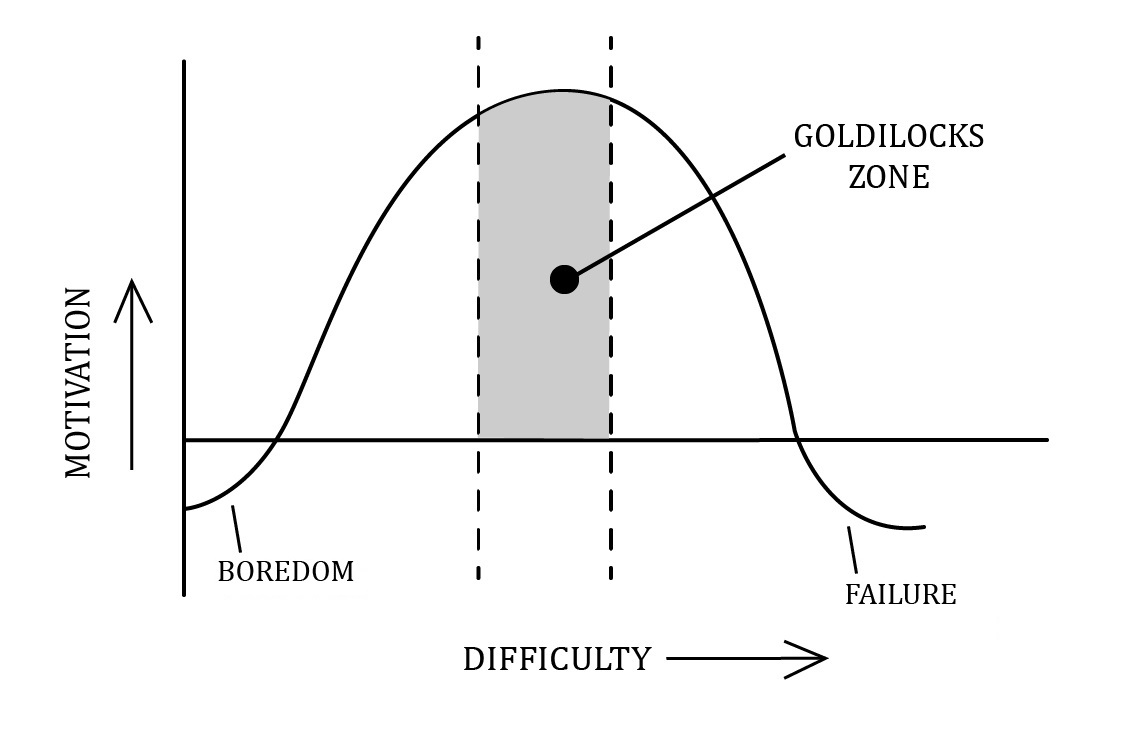I was reminded about The Goldilocks Rule this week, and it made me think about two random and seemingly disconnected things.
The first is that it explains why I love The Legend of Zelda so much compared to other similar-ish games like Elden Ring. The second is that understanding this rule is one way that teachers, mentors, leaders, parents, etc, go from good to great. It’s worth considering how to improve your own motivation through this lens.
First, a definition of The Goldilocks Rule (using Bing AI, which leans heavily on James Clear):
The Goldilocks rule is a concept that human beings are most productive and motivated when they are challenged, but only a moderate amount. If the challenge is too big or difficult, the individual does not want to complete it because of that reason. The Goldilocks Rule states that humans experience peak motivation when working on tasks that are right on the edge of their current abilities. Not too hard. Not too easy. Just right.

There are so many ways you can see The Goldilocks Rule proven in everyday life.
We’re been playing a LOT of Switch over the summer, and it’s become the most-used console in our home. Nintendo has a way of making their games adhere to the Goldilocks Rule for a vast cross-section of the population. The recent entries in The Legend of Zelda series are prime examples. Many modern games take pride in how punishing they are, requiring hours of study “outside” the actual game to understand “the meta” for how the game actually works. It’s exhausting (I’m looking at you Elden Ring). Nintendo’s games, on the other hand, never feel like a chore. They’re challenging but not too much so, and they are able to motivate both the old (me) and young (my son is nearly seven) in equal measure by brilliant design that keeps your wins just ahead of your losses.
I’m reading American Prometheus at the moment (trying to get a good amount through before I watch the film), and turns out that Robert Oppenheimer understood The Goldilocks Rule as, it would seem, every good teacher does. In one story, Oppenheimer told a student of his (Joseph Weinberg) that found a proposal paper on his desk to “Put that down. That problem is not for you.” It turns out it was for another student that was struggling with something too difficult and losing motivation.
“Weinberg now realized that Oppie had planted this thesis problem for this very student. It was a distinctly easy problem, “But it was perfect for him,” Weinberg said, “and it got him his Ph.D. It would have been difficult for him to get it with Oppie if Oppie had treated him the way he treated me or Phil Morrison or Sid Dancoff.” Instead, Weinberg insisted years later, Oppie nurtured this student as a father would have treated a baby learning to walk. “He waited for him to discover that proposal accidentally, on his own terms, to pick it up and to express his interest, to find his way to it. . . . He needed special treatment, and by God, Oppie was going to give it to him. It showed a great deal of love, sympathy and human understanding.” The student in question, Weinberg reported, went on to do distinguished work as an applied physicist.” (Kai Bird and Martin J. Sherwin, American Prometheus)
Good teachers, like good games, are able to set the challenge level just right.
Unmotivated? Maybe what you are doing is too hard or too easy. Adjust as necessary.








Comments welcome!